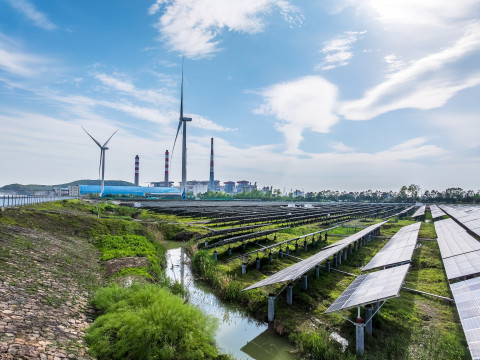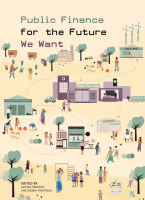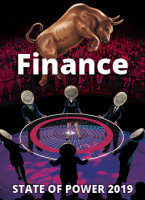A global public banking ecosystem breakthrough
Following decades of private finance failures, we’re having a breakthrough. TNI, McMaster University’s Public Banking Project and Eurodad are spearheading a proposal to replace private finance with a global ecosystem of public bank collaborations. This radical policy proposal is now being picked up by the T20, a G20 engagement group of think tanks and research centres aiming to impact G20 Finance processes this November in Brazil. And it’s serving as an evidence input towards the United Nations’ 2025 International Financing for Development Conference in Spain.
Here you can access the T20 Policy Brief on which this blog is based.

Shutterstock/2466848565
A Global Public Bank Ecosystem
To usher in sustainable and equitable development, the world needs at least $30 trillion in additional investment over eight years.1 At the current pace of investment, countries will miss one climate target after the other. Two reasons underpin this failure: an over-reliance on private finance and under-utilization of public finance capacity.
What alternative action can deliver the required financing for climate action and equitable development?
One viable and much needed solution is the intentional and coordinated mobilization of the world’s existing public banking capacity. Specifically, policymakers should call on public national development banks (NDBs) and multilateral development banks (MDBs) to begin fostering a global public finance ecosystem grounded in accountable and democratic collaborations.2
A global ecosystem is needed to deliver green and just development and climate finance at the pace, scale, and on the terms required to spur more sustainable and equitable development. Forming an ecosystem based on public bank to public bank collaborations has the capacity to meaningfully advance finance for sustainable development and do so in ways grounded in equitable development.
Pro-private finance strategies have failed
The international finance community has mainly advocated private-led development solutions to address global grand challenges like climate change. The evidence, however, suggests that private investors have underperformed and fall far from providing sufficient or appropriate finance. Effective decarbonization has faltered.3 Data on total climate finance shows that private investors collectively under-invest compared to public financial institutions.4 This is despite having four times the capacity of public financial institutions. By seeking to maximize profits, socially just transitions and equitable development remain secondary concerns for private investors. The search for attracting private investors has led to the proliferation of public-private partnerships (PPPs), blended finance, guarantees and other so-called de-risking options. These pro-private options are advanced by the World Bank and involve using public funds to underwrite private sector profits. The hope is that public money mobilizes more private finance, but the opposite is true: private investments tend to require more public funds than they bring in themselves.5 With its hidden liabilities and high fiscal and human costs, PPPs and blended finance also increases the already unsustainable debt burden on governments and citizens.6
Pro-public strategies are the future
Currently, over 530 public development banks across the globe finance 10 to 12 percent of global investment. These public financial institutions can do more and better. If you add to the development banks the world’s existing public commercial, saving, cooperative and universal banks, which focus more on retail and day to day services, like savings accounts, mortgages, credit cards, etc., then there are over 1100 public financial institutions with over $91 trillion assets in 2024.7 Public to public collaborations among these 1100 public financial institutions can provide more finance under better terms, if the right governance structures and policies are in place to serve the public interest.
This is no pipe dream. The world’s multilateral, national, and subnational public development banks (PDBs) are already working together. There are promising existing PDB practices that can serve the public good.8 These public-public collaborations should be advanced, systematized, and bent toward greener and truly just transitions. Intentional and coordinated investments can pave the way for achieving collective adaptation, mitigation, and biodiversity goals.
PDBs need to be made better
There is, however, nothing inherently good or pro-public about public banks. Public banks are contested institutions subject to wider power relations in society.9 While PDBs rarely have profit-maximization mandates, when PDB enable private profits they can undermine the public interest. To overcome this, PDBs need to improve their systematic alignment and tracking of development and climate financing, including transparent reporting.10 To prevent PDBs from being captured for private gains and to help them act in pro-public ways, more democratic, transparent, and accountable frameworks are needed. This involves resetting the social mission and mandate of PDBs as part of building better public governance. Multilateral PDBs, in particular, must be completely overhauled – starting from their colonial governance structure – to truly support countries to face the financial, environmental and social challenges that a world in polycrisis poses.11
Fostering a global public financial ecosystem
Policymakers, politicians, and populations at large need to call on PDBs within their societies to begin fostering a global public finance ecosystem. The ecosystem can be shaped as a policy-driven system of collaborative transfers that involve financial resources, knowledge, expertise, and commitments to the collective action needed to overcome shared global challenges. The global public ecosystem can be initially based on public development bank collaborations.
Such a policy-driven ecosystem must rest on democratic collaborations that target effective decarbonization and equitable development finance. For example, creating a Global Governance Forum as internal to the ecosystem can ensure transparency and sustainability. This would be shaped by participants through broad-based consultations on how to ensure equal voice and representation.
There are benefits to fostering an accountable global public ecosystem. Coordination and collaboration can help to make the most effective use of existing public finance capacity, replacing market competition and profit-maximisation. Public-public collaborations in banking can bring down the cost of capital while increasing the accountability and transparent impacts of climate investments. Intentional policy-based collaborations can support knowledge and expertise transfers between multilateral, national, and sub-national public banks. At the same time, a global public ecosystem can facilitate the implementation and monitoring of key multilateral commitments, including the 2015 Paris Agreement, the Sustainable Development Goals, the Convention on Biological Diversity, and the United Nations Declaration on the Rights of Indigenous Peoples, including Free, Prior, and Informed Consent. Through collaboration all public banks can be strengthened and empowered to support sovereign development pathways in ways that advance rapid and meaningful climate action.
Policy-driven and pro-public financing is needed to address global challenges. Public banks have the existing resources and institutional foundations to provide development and climate finance at the pace, scale, and on terms required for green and just transitions.12 A global public finance ecosystem, fostered by PDBs, is not only possible but necessary for achieving equitable development and just climate action.



